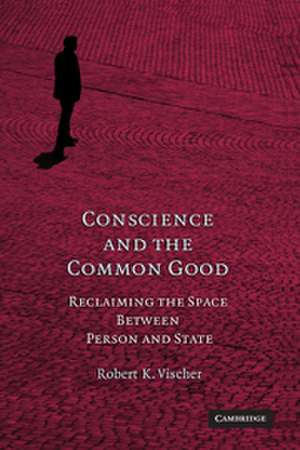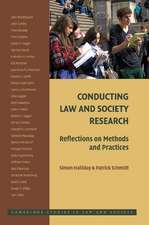Conscience and the Common Good: Reclaiming the Space Between Person and State
Autor Robert K. Vischeren Limba Engleză Hardback – 13 dec 2009
| Toate formatele și edițiile | Preț | Express |
|---|---|---|
| Paperback (1) | 303.30 lei 6-8 săpt. | |
| Cambridge University Press – 13 dec 2009 | 303.30 lei 6-8 săpt. | |
| Hardback (1) | 502.46 lei 6-8 săpt. | |
| Cambridge University Press – 13 dec 2009 | 502.46 lei 6-8 săpt. |
Preț: 502.46 lei
Preț vechi: 564.55 lei
-11% Nou
Puncte Express: 754
Preț estimativ în valută:
96.14€ • 100.65$ • 79.55£
96.14€ • 100.65$ • 79.55£
Carte tipărită la comandă
Livrare economică 05-19 aprilie
Preluare comenzi: 021 569.72.76
Specificații
ISBN-13: 9780521113779
ISBN-10: 0521113776
Pagini: 326
Dimensiuni: 160 x 235 x 21 mm
Greutate: 0.62 kg
Ediția:New.
Editura: Cambridge University Press
Colecția Cambridge University Press
Locul publicării:New York, United States
ISBN-10: 0521113776
Pagini: 326
Dimensiuni: 160 x 235 x 21 mm
Greutate: 0.62 kg
Ediția:New.
Editura: Cambridge University Press
Colecția Cambridge University Press
Locul publicării:New York, United States
Cuprins
Introduction; Part I. The Relational Dimension of Conscience: 1. Conscience in law; 2. Conscience in the person; 3. Conscience's claims; 4. Conscience and the common good; Part II. Implications: 5. Voluntary associations; 6. Pharmacies; 7. Corporations; 8. Schools; 9. Families; 10. The legal profession; Conclusion.
Recenzii
“There is no freedom more essential to the flourishing of a truly liberal democracy than the freedom to live one’s life in accord with the yield of one conscience—that is, with one‘s religious and/or moral convictions and commitments. And yet, the nature and implications of that freedom—which we may call freedom (or liberty) of conscience, and which of course cannot be absolute—are not well understood. Conscience and the Common Good is an excellent, engaging discussion of how to understand freedom of conscience and of how to protect it in a contemporary democracy, such as the United States, whose citizens disagree deeply among themselves about such morally fraught matters as abortion and same-sex marriage. Robert Vischer’s book is must reading for citizens and scholars interested in freedom of conscience.”
--Michael J. Perry, author of The Political Morality of Liberal Democracy
“When should claims of conscience override state-imposed norms of nondiscrimination and equal access to goods and services? Robert Vischer brings a fresh and subtle perspective to these questions, arguing for a “moral marketplace” in which, whenever possible, different groups and businesses follow competing moral norms. Vischer offers a probing and sophisticated analysis of a timely problem.”
--Andrew Koppelman, author of A Right to Discriminate? How the Case of Boy Scouts of America v. James Dale Warped the Law of Free Association
"Safeguarding the conditions of human flourishing and freedom is rarely a simple matter of fending off government intrusion or asserting one’s abstract rights. As readers of this volume will better appreciate, it turns out to involve a project of tending more deliberately to the overall social ecology, with attention to the complex ways people communicate and interact in shared spaces. Vischer’s erudite and skillful analysis highlights the thick interpersonal commitments situated within the myriad associations that mediate between individuals and the state. Only within this context will a healthy respect for conscience be guaranteed today." - Thomas J. Massaro, America Magazine
--Michael J. Perry, author of The Political Morality of Liberal Democracy
“When should claims of conscience override state-imposed norms of nondiscrimination and equal access to goods and services? Robert Vischer brings a fresh and subtle perspective to these questions, arguing for a “moral marketplace” in which, whenever possible, different groups and businesses follow competing moral norms. Vischer offers a probing and sophisticated analysis of a timely problem.”
--Andrew Koppelman, author of A Right to Discriminate? How the Case of Boy Scouts of America v. James Dale Warped the Law of Free Association
"Safeguarding the conditions of human flourishing and freedom is rarely a simple matter of fending off government intrusion or asserting one’s abstract rights. As readers of this volume will better appreciate, it turns out to involve a project of tending more deliberately to the overall social ecology, with attention to the complex ways people communicate and interact in shared spaces. Vischer’s erudite and skillful analysis highlights the thick interpersonal commitments situated within the myriad associations that mediate between individuals and the state. Only within this context will a healthy respect for conscience be guaranteed today." - Thomas J. Massaro, America Magazine
Notă biografică
Descriere
Conscience and the Common Good reframes the debate about conscience by bringing its relational dimension into focus.


















